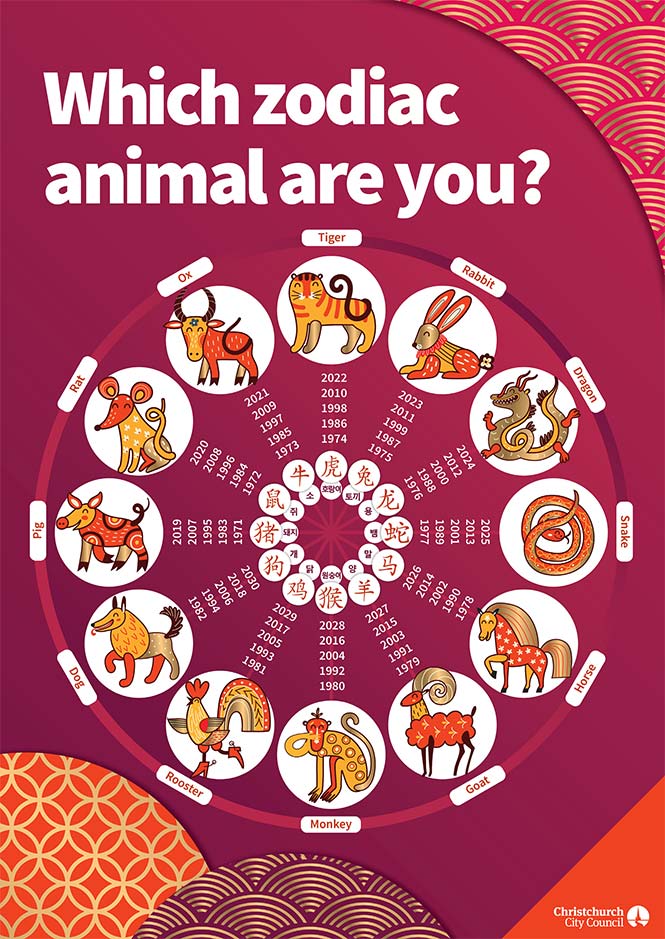The 2024 Lunar New Year Day falls on 10 February. We have various events and activities happening in libraries from 10 to 24 February to celebrate the traditional festival.
The Year of the Dragon龙年
According to the 12-year-cycled lunar calendar, this year is the year of the dragon, starting from 10 February 2024 to January 28th, 2025. The year of the dragon includes 2024, 2012, 2000, 1988, 1976, 1964, 1952, 1940, 1928, 1916... People born in one of these years will be in their year of fate本命年.
The dragon is the fifth animal in the Chinese zodiac. Chinese people believe that the dragon is an icon representing good luck, strength, power and wellbeing. This belief would explain the fact that in China, babies born in the year of the dragon are more than those born in any other zodiac year.
You may also notice that the dragon is the only mythical animal on the Chinese zodiac. Its unique position originates from Chinese people's cultural beliefs on and practices in the dragon worship.
Cultural Beliefs and Practices of the Dragon
The Chinese dragon is first created in legendary stories, mythology, and tales. One of widely-accepted explanations of its origin and appearance is that it is created through totem. In the Records of the Grand Historian(Shi Ji史记), it reads that the dragon is the integrated creature of several animals which are the totems of tribes united by the Yellow Emperor(Huangdi), one of legendary rulers.
Unlike some cultures viewing the dragon as a symbol of evil and darkness, the Chinese culture places the dragon in a noble status in their belief system and practices.
No matter where they live, Chinese people identify themselves as "the descendants of the dragon" as they believe that Yan Emperor, another legendary ruler, was born by his mother's telepathy with a mythical dragon.
In ancient China, the dragon was an ever-present symbol for imperial power and the male element Yang. The emperor was known as "the dragon". The imperial robe was embroidered with the image of dragon. Everything the Emperor used was ornamented with dragon motifs to show his statue as the highest ruler. If you visit the Forbidden City in Beijing, you can see how frequently the dragon sculptures and carvings appear in the imperial palace.
Chinese people believe that the dragon is responsible for making clouds and rains, which greatly affect agricultural production. Temples of Dragon King are built nationwide for people to worship and get blessing for their crops and domestic animals. The image of dragon can be found in all kinds of traditional art, like sculpture, painting, embroidery, buildings, porcelains, and ornaments. A well-known painting scroll called The Nine Dragons depicts dragons with different faces and bodies, soaring in waters and mists. The symbol of a dragon is also part of the well-known ancient scientific instrument called Houfeng Didong Yi候风地动仪. It was the world's first seismoscope created by Zhang Heng张衡, a scientist in the later Han dynasty (AD132), to measure the seasonal winds and movements of the Earth.
Chinese people’s love and worship to dragon can be seen in various ways. Ordinary people's names may have the Chinese character of dragon龙. The dragon also appears in the Chinese literature, idioms and proverbs. The dragon dance is usually performed during the Chinese New Year to bring people good luck. The Dragon Boat Festival on the fifth day of the fifth month of the lunar calendar is one of major folk festivals for Chinese people to worship ancestors and pray for good luck.
We wish the powerful dragon will bring you good luck in the Year of the Dragon.
More Lunar New Year events and information
- Library events and activities on 2024 Lunar New Year
- Happy Chinese New Year Festival 2024
- 2024 Christchurch Lunar New Year Parade
- 2024 Lunar New Year Celebration at Richmond Community Garden
- Library resources on the lunar new year
- Library resources on the Chinese new year
- Library resources on the Chinese Zodiac
- Library picture and boards books on the dragon
- Library comic books and graphic novels on the dragon





Add a comment to: Unveiling the Chinese Dragon in the Year of the Dragon